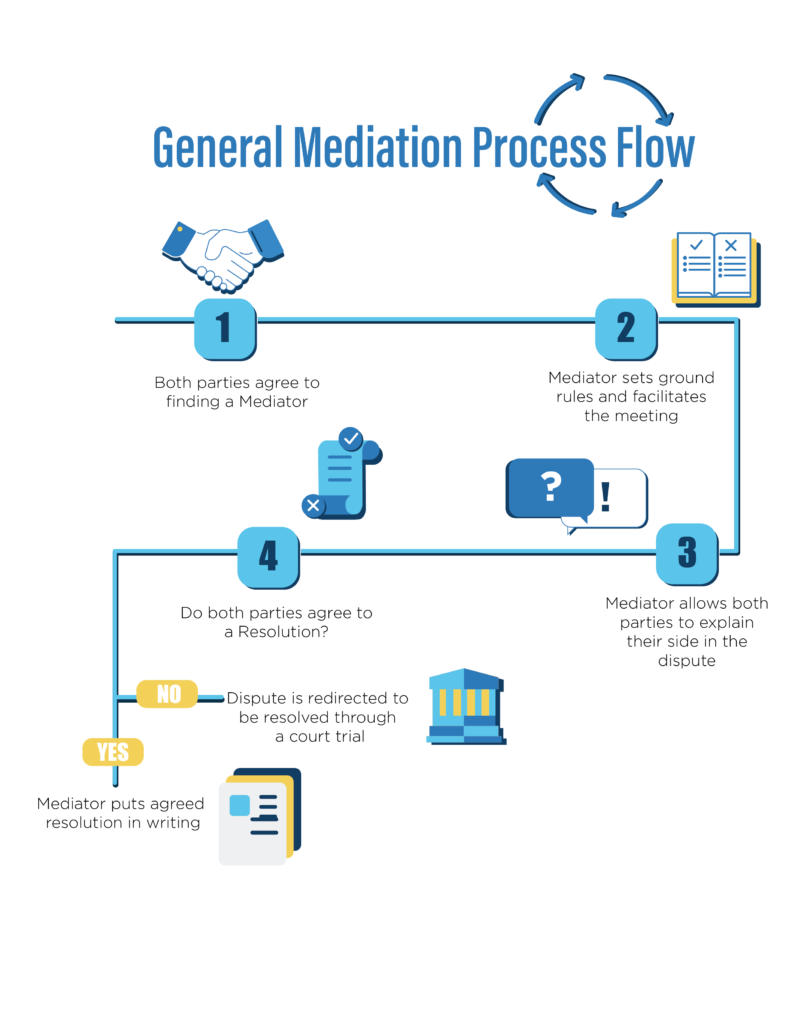NSW 2009, Australia
100 Harris St, Pyrmont
24/7 Customer Support
Mon - Fri: 8:00 - 18:00
You can contact us during the above work hours.
Construction Lawyer & Building Solicitors Sydney | Contracts Specialist Law Firm
100 Harris St, Pyrmont
24/7 Customer Support
You can contact us during the above work hours.
Mediation is a type of alternative building dispute resolution that you can do before taking your issue to the courts. Resorting to mediation may help you resolve your building problem easier, saving the time and money needed in court trials.
Need expert legal advice on mediation? Contracts Specialist can give it.
First consultation is FREE.
Mediation is the legal process between two parties on finding a resolution among themselves with the help of an independent third party or a mediator. This process is not as legally binding as a court decision, but it’s a good way to fix a dispute.
In this setup, the mediator doesn’t imply a solution. He lets the two parties come up with a solution to their problem within themselves. The mediator gives each the time for both parties to air their points of view in the situation. They may even resolve it without going to court anymore.
Like any other alternative legal process, it is designed to resolve your dispute as time and cost efficient as possible. It even tries to prevent a court trial from happening. Since mediation is one of the alternative legal processes that you can try, here are its advantages and disadvantages:
With mediation, you get to explore a wider set of options to resolve your options. It can be also used to settle all sorts of disputes, even the simpler ones. The only ones involved in the decision are you, the other party, and the mediator in a private meeting.
Also, it is cheaper and faster to do it than a court trial. You can even come up with a solution with less pressure. What you would talk about in the mediation process is strictly confidential and require everyone to follow set ground rules.
A disadvantage with undergoing mediation is that you cannot legally enforce the resolution unless it’s written as a legal document. You still have to make it legally bound to the law. So, you would have the assurance that the other party will comply with what you agreed on.
Also, if the case goes to court even after mediation, things can turn against you. The other party can use the information you shared during the mediation process to make their case stronger.
Like any other alternative legal process, it is designed to resolve your dispute as time and cost efficient as possible. It even tries to prevent a court trial from happening. Since mediation is one of the alternative legal processes that you can try, here are its advantages and disadvantages:
If you are decided to undergo mediation, it should be a mutual decision with the other party. There are a lot of organisations that can help you get a mediator. Here are some of the people who you can look for mediating into your building disputes:
Community Justice Centres (CJC) can help you in mediating all sorts of problems, including construction disputes. Their mediation services are free, and you can set a convenient date for both parties and better resolve the situation.
You can also have the option to hire the service of a private mediator, provided that you both agree to the appointed mediator. They may charge a fee, but these are the mediators that could specialize in certain topics, handling the situation better.
Courts and Tribunals could also directly refer you to a mediator before actually taking your case to court. They may refer you first to a mediator in order to see whether things could be still clarified before trial.
In mediation, you would need to first find a mediator. Whether you have a mediator or court assigns you one, there is no set structure of what’s going to happen. You just would have to show up with the other party on your most convenient time.
Usually before you begin, the mediator introduces you to everyone involved and give you some ground rules. Since this is a private event, these rules are set to make sure this meeting would be highly confidential.
Then, the mediator facilitates the discussion by giving each party a chance to explain their points of view. Both parties would take their turn, and the mediator would have to help them discuss these within themselves.
The mediator may also have the option to talk to each party separately. He can also give them time to talk to their lawyers and other support before coming up with a decision. The mediator can only help in facilitation, and in putting the resolution into writing if mediation is a success.


Like any other building dispute resolution process, you would have to prepare and explain your case well. To better give a case to the other party and mediator, you would need the help of a Contracts Specialist. We can help you highlight the things you should be saying in mediation, stating your point of view better.
We can also advise you if mediation is best thing that you can do in your situation. Contracts Specialist can help and guide you in any legal process that you need to undergo. So that, you get to resolve your building as time and cost efficient as possible.
If you’re a homeowner in New South Wales, it’s crucial to understand Construction Law to protect your investment. This ultimate guide to Construction Law is specifically designed to provide homeowners with essential insights into the legal landscape of home building in NSW.
If you’re a homeowner in New South Wales, it’s crucial to understand Construction Law to protect your investment. This ultimate guide to Construction Law is specifically designed to provide homeowners with essential insights into the legal landscape of home building in NSW.